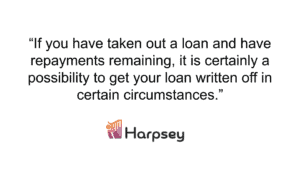If you have taken out a loan and have repayments remaining, it is certainly a possibility to get your loan written off in certain circumstances. You might find that you have overdue payments and you are struggling to repay the loan, and you might be wanting to end contact with your lender.
For your loan to be written off, the lender will effectively write off any remaining balance of the loan and you will no longer need to make any repayments. You could have a small amount left to pay and this will be wiped.
It is not common for this process to happen, as loan fees are a big part of the loans business – Americans spend around $9 billion annually on loan fees. However it is possible to have your fees written off in instances when bankruptcy is declared, someone else pays off your loan or if you find yourself physically unable to earn an income.
Below is outlined by Harpsey a number of ways that debt can be written off. If you are finding it hard to meet your loan repayments you could read our guide here.
What Are The Ways My Loan Can Be Written Off?
Your Loan Is Paid In Full By A Relative
A common way for a loan to be written off would be for a family member to pay off your loan for you. You will no longer be chased by your lender and the stress of your loan repayments will be removed. This is more likely in cases where borrowers borrow $500 or similar amounts, rather than tens of thousands.
With your loan being paid off in full it could be a chance to negotiate on the repayment terms. Your lender might be open to taking an instant payment and clearing your debt.
Declaring Bankruptcy
If you declare bankruptcy, you are officially confirming a legal state of not having any money. This is actioned by a court and for the time being will mean your lender will refrain from contacting you for immediate repayments.
Many lenders will look to change your repayment plan over a longer period of time however in some cases your lender may write off your loan if there is only a small amount to be repaid. Always have confirmation of your loan repayments being canceled in writing, never assume that bankruptcy means your loan has ended.
You Have Been Mis-sold Your Loan
You might be eligible to make a valid claim that your loan was mis-sold to you and potentially have your loan written off. For example, your loan might have been topped up without financial and employment checks meaning you cannot afford your loan.
This scenario is not common in the US, but your payday loan can be reclaimed and you could even receive compensation. Speak to an attorney if you feel you have a strong case to have your debt written off.
Your Lender Goes Out Of Business
The payday loan lender you have an active loan with could potentially go out of business. Although they might try to recover whatever funds they can of your remaining balance, in some cases your loan could be written off.
Should your lender go bust, remember that you can have an opportunity to negotiate the terms of your loan and only repay the minimum amount you need to.
Financial Hardship Programs
Some lenders offer financial hardship programs for borrowers who are struggling to make their loan repayments due to unexpected financial difficulties. These programs can provide temporary relief by reducing or suspending your repayments for a certain period.
In some cases, the lender may even forgive a portion of your debt. You should always check whether this is an option.
Statute of Limitations
Each jurisdiction has a statute of limitations, which is a time limit within which a creditor can legally sue you for the repayment of a debt. Once the statute of limitations has expired, the lender can no longer pursue legal action to recover the debt.
However, be cautious as the statute of limitations varies depending on the type of debt and jurisdiction. Consult with a professional such as a lawyer or an advisor to understand how the statute of limitations applies to your specific situation.
Loan Forgiveness Programs
In certain cases, loans can be forgiven through specialised programs. For example, student loans may be eligible for forgiveness under specific circumstances, such as working in certain public service professions or meeting income-based repayment criteria.
Research the options available for your specific type of loan to determine if you qualify for any forgiveness programs. If you do, let your lender know.
Disability or Death
If you become permanently disabled or pass away, it is possible that your loan may be written off. However, the conditions for loan forgiveness in these cases can vary depending on the lender and the terms of the loan agreement.
You should promptly inform your lender of any such circumstances and provide appropriate documentation to explore potential options.
3 Steps To Take To Get Your Loan Written Off
1. Contact Your Lender
As with any change you want to make to your loan repayments, it is essential to communicate with your chosen lender about your payment plan. Do not ignore their attempts to contact you by phone and email as this could lead to serious consequences for your credit rating.
Inform them if you find yourself bankrupt or unemployed. They might be flexible and help come up with a more affordable repayment plan.
2. Make An Arrangement
This is a way to pay off your remaining loan balance in smaller amounts. It could be an affordable way to meet your repayments and although it might impact your credit score, it is a formal way to eventually write off your loan.
3. Make A Claim To Write Off Your Loan
You could speak to an attorney if you think that you should not have been offered a loan due to your employment situation, financial position or physical health. This could be an option if you still owe a lot of money.
You should be aware that your lender has lent you money in good faith with the expectation of repayment. If you have the means to repay your loan you should not look for ways to get out of this.


